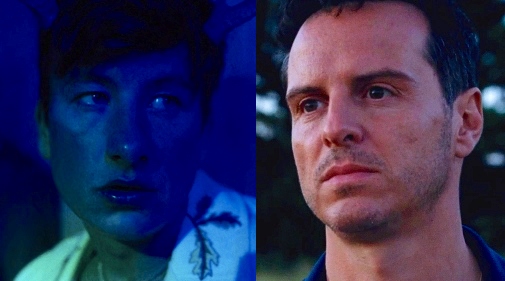
Earlier this week, the Almost There series returned with a look at Penélope Cruz's failed bid for the Best Supporting Actress Oscar. Now, it's time to move on to Lead Actor, where the season's most prominent contender without a nomination was Leonardo DiCaprio in Killers of the Flower Moon. But since you're probably tired of reading my defense of Scorsese's latest, I decided to focus on two others instead. The first victim is Barry Keoghan in Saltburn, for which he was nominated at the Golden Globes, BAFTAS, and Critics Choice Awards. Our second sacrifice is Andrew Scott, whose campaign for All of Us Strangers was full of passion but few actual plaudits. There were nominations at the Globes, Spirit and British Independent Film Awards, little else...
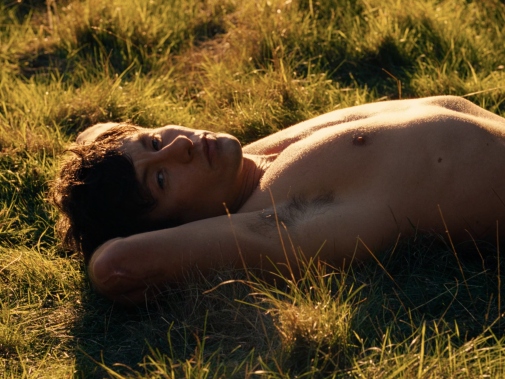
My first brush with Saltburn resulted in a rather negative reaction. Maybe it was allergy or, perchance, the pang of hunger for a more substantial treat. I found myself dripping with disdain, the taste of vitriol sweet in the mouth as it can sometimes happen to critics who've just spotted something juicy in cinematic iniquity. Emerald Fennell's sophomore feature seemed to confirm all my worst suspicions about her Promising Young Woman while failing to meet the pledge of provocation set by early viewers, reviewers, publicists. In other words, it didn't live up to the hype.
Instead of a daring, fresh thing, it's leftovers of Brideshead Revisited, The Servant, and Mr. Ripley, some forgotten bite of Teorema thrown in the microwave for a lazy dinner. Stupid, tasteless, dumber than advertised. Yet, words exchanged with friends, and opposing views expressed by writers I admire have made me eager to revisit Saltburn. Is it slyer than I initially presumed? Perhaps when you lose the idea of class commentary between the lower and highest circles, envy among the wealthy starts to materialize.
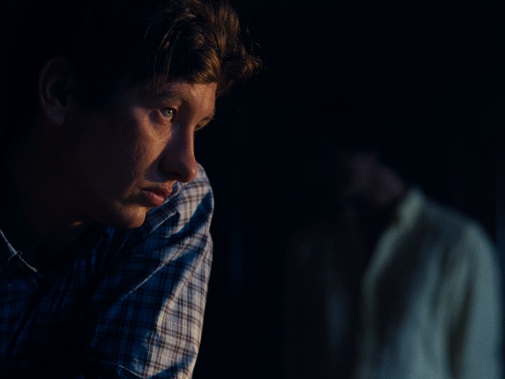
Then there's the question of desire, the coveting instinct so strong it can lead to an interior apocalypse. The ravenous beast that is Man may not know the difference between wanting something, someone, and wanting to be them. And in its frenzy, the beast might just destroy what it hunts. Hunger is inherently violent in Saltburn, as the pursuit of ownership is love that kills. But are these ideas inherent to the film or mere projections, new meanings provided by the audience instead of the artists? Is it sharp, or as worthless a class critique as it first seemed?
Frankly, I'm undecided. But I'm not nearly as conflicted regarding the merits of one particular element. Even as I might view Saltburn in a more positive light, Barry Keoghan's performance still wallows in the shadow of mediocrity. He's not alone, it must be said. Most of the actors can't quite negotiate the picture's demands, either capitulating to scripted incoherence or hollow stylization. Only Elordi succeeds, making Felix Catton equal parts endearing golden boy and spoiled prince, floating by on a cloud of privilege, perpetually bereft of self-awareness. Between want and revilement, his Felix is slippery.
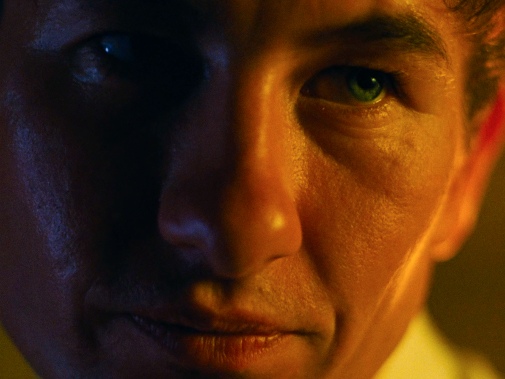
Keoghan's Oliver Quick is comparatively duller, much simpler and more predictable, no matter what the film's circular structure and putative twist might imply. Reminiscent of the thespian's effect on Killing of a Sacred Deer, his mere presence casts a shadow of suspicion over the character, every reaction and action laced with arsenic. Earnestness is never a possibility, for Keoghan underlines the performance and signals every choice of Oliver's, as he endears himself to the Catton clan. A poor boy making friends with the rich, lying through his teeth to turn himself part of the family just as tragedy upon tragedy shakes their foundation. I dare say his poison is too clear, insincerity naked and on display.
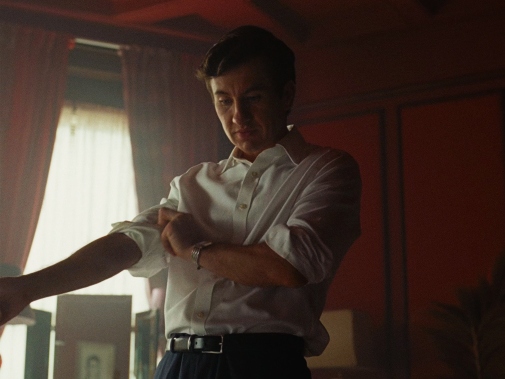
So much so that what it says about his victims and their environment is more interesting than what it reveals about Oliver. The vampire's menace shows how eager the blood bags are, practically begging to be sucked dry. They extend their hands out of noblesse oblige, palms up and fingers frosted with diamonds, a pittance proffered to their charity case – more like a pet that can't be bothered to hide his fangs. If only the film allowed any of the Cattons to be a co-lead of some sort. That would help its comedic balance greatly, decentering the "straight man" who plays it seriously even when the movie clamors for a clown. He's at his best when letting himself be consumed by rage, anyway.
And oh, what a horny little bugger he can be. Oliver's actions reveal him as the animal sniffing for sweet treats. Looking up between the Catton's legs, he laps at the clotted cream and strawberry jam found within. But is that craving genuine or another subterfuge among many? Keoghan is simultaneously obvious when suggesting murderous intent, but a bit too obscure when engaging with his character's most secret longings. It's not shyness, surely. Fucking Felix's grave was the actor's idea, after all, and the bath scene is splendidly shameless.
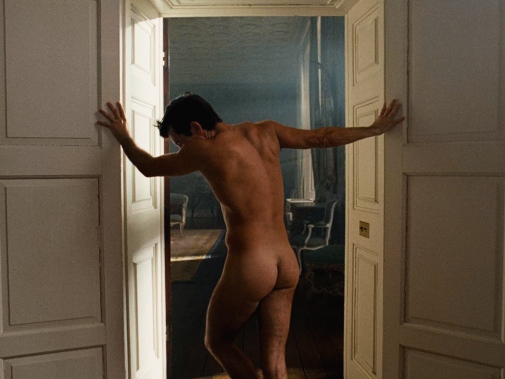
There's also the full monty prance to end it all, full of energy if perchance so studied its spontaneity falls short of what it could have been. There is so much potential that never becomes more than just that. The promising young star remains promising under Fennell's gaze, but the pledge for cinematic excellence is more than what he can fulfill. At least he looks great while failing. The demon twink vibes become him, maybe too well for what the role needs. Alas, that's art, littered with almost as many compromises as fresh tombstones in the Catton family plot.
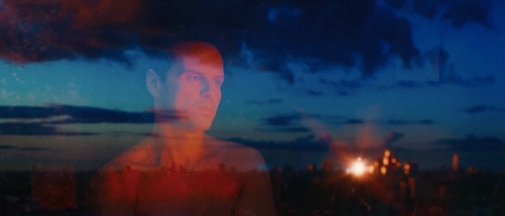
From gay-baiting vampirism to queer phantasmagoria, let's assess Andrew Haigh's adaptation of Strangers, a 1987 Taichi Yamada novel whose writer protagonist couldn't be more different than Andrew Scott's Adam. In the 2023 picture, the lead's screenwriting career is a near-non-factor, one among many absent details that join forces to strip the character of personality. For better and worse, Scott plays a blank slate unto which the viewer is invited to deposit their desires and despairs, their sorrows and loneliness. It's not even just a matter of imagining him against the novel's figure, for there's also a Nobuhijo Obayashi movie to consider.
In the book and its adaptations, both Harada and Adam are the architects of their loneliness for one reason or the other, but only the Japanese versions allos that fact to become the most evident and cutting part of his being, the purpose of this particular study and story. Even as Scott's passive self-effacement might be more relatable, there's something to be said about the original character's awfulness being more cinematic. Indeed, Adam is a ghost-like abstraction from the film’s very first shot.
Watching the sun peek over the London skyline, a wash of gold comes all over the screen, letting us see the man beneath the cityscape reflection. An observer, he's separated from the world by a pane of glass. Metaphor and reality are one, material and cold, in one lonely, alienated existence. Even when an alarm rings, Scott walks so slowly out of the building as to suggest fatalism. If there were a fire, maybe Adam would have liked to be embraced by its annihilating warmth. If only he were as transparent going forward, when the plot's unraveling depends on him as an anchor.
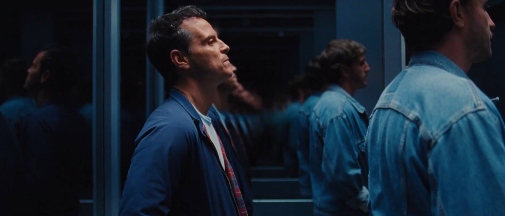
Take his initial reaction to Paul Mescal's Harry, the man’s only neighbor, drunk and desperate for company. Scott makes Adam nearly unreadable beyond the immediate skittishness of someone who wants to be alone met by a rambling stranger, slumping on the doorframe with Japanese whisky in his hand and on his breath. Crucially, Haigh denies us the visual of Adam's decision to close the door on the hunk's face. It's lost in a jump cut. The effect startling, smart in visceral terms though troubling when it comes to establishing a central character. The same dynamic repeats ad nauseam and to varying extents.
Encouraged by such directorial choices, Scott hones on the apathetic ambivalence of someone whose interior self is a moor, fog so thick you think yourself lost in the limbo between existence and oblivion. You don't think, you scarcely react. You simply act as a soul failing to operate a body moving on auto-pilot. And then, one afternoon, the parents you lost to a car accident many decades ago rematerialize before your eyes. In Scott's gaze, the father provokes bemusement, the mother a frightened stare. Peace soon settles, though it may be terror suffocating under cover of numbness.
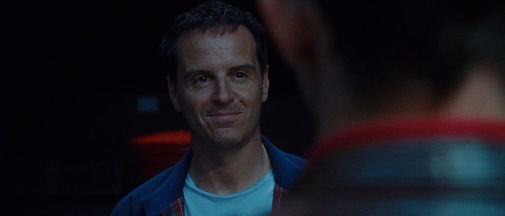
His is not the face of a man meeting the beyond but an unknowing drunkard giving in to the liquor of nostalgia. There's no doubt, little resistance, total surrender. A mystery he remains, but the parents are fleshed out from the moment we meet them. The living man is barely a sketch, each silent response in closeup a stab of color so watered down it slides off the paper without leaving much of a trace. To be fair, he's most human when with Harry, flirtation accepted and turned into a hookup, turned into something more. Indeed, a candidate for the film's best scene is their first rendezvous, so candidly performed with uncertainty following every charge of eros.
The moment feels observed from life, one of the best depictions of such things ever to reach the screen in a mainstream package. The magic's in the reticence, the flash of insecurity and that tender awkwardness that makes it so real, the sight so oddly transgressive. The coming out conversation with the ghost of Adam's mum is another highlight, starting with trepidation and a smile that quickly curdles when her reaction isn't ideal. He becomes sour in response, the sadness returns, and so does a new argumentativeness. When he asserts that, if he's lonely it's not because he's gay, a glimmer shines in the corner of his eye even as the mouth resolves in a stern line.
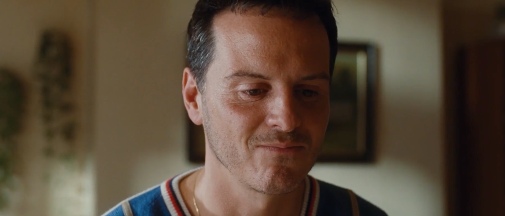
In that instant, Scott plays someone who's revealed too much, embarrassed and unable to enjoy a pyrrhic victory over a domestic chit-chat. It's all very different from the book, where the parents are closer to that idealization, siren-like in their beckoning song while the lead is the prickly one of the bunch. As writer, Haigh inverts the balance, but I'm not sure Scott finds a way to solve the new challenges. There's a way to make the depressed ambiguity of a lost soul exciting, colorful without betraying a necessary vagueness, but I'm not sure this leading man found it. Mescal did, though. Comparing the two becomes a treacherous game that does the film or Scott no favors.
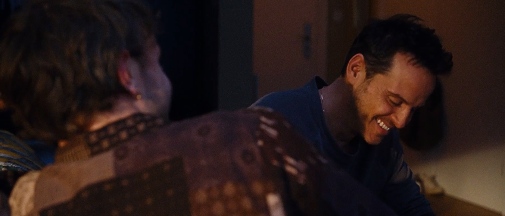
He's delivering a generous performance, in any case, almost to a fault. Scott is there to help his scene partners delineate their complex characters, ghosts more palpable than the fellow with a beating heart. Even his tears, his raw vulnerability when asking his father for a hug feel like foundation for Bell’s paternal turn instead of Adam's characterization. Where's the generosity to Adam in all this? On one level, it makes sense for Scott's work to be this flimsy, since the man’s unknowingly detaching from the world of the living as he seems to learn to live again. On the other level, it leaves the character feeling murky. He's a blur within a painting that's otherwise rich in detail.
It's giving one note, if I'm to be brutally frank about it. Switching painting metaphors for music, Scott knows how to play that note like nobody else. He's a master player of that one note. But it's still just one, and the heart asks for a symphony. Still, fair's fair, and whatever my issues with Scott's performance, he aces his last scenes with each of his ghosts. The path there may not be the most solid, but the end is a triumph of acting architecture, like some great tower reaching to the heavens, Babylon rebuilt. It's also in these scenes that Scott's interpretation feels most distinct, his perspective more active in shaping Adam, his story, his fate.
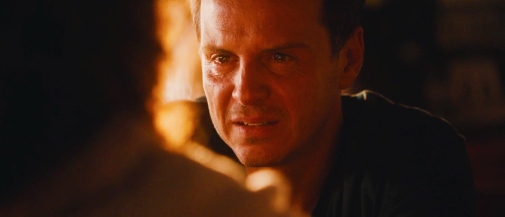
There's such care for Harry as All of Us Strangers draws to a close, the nurture of one who loves but is clear-headed about what's real and what's not for the first time in forever. As Scott performs it, we get to see the boy who wasn't with his mother as she woke up after the accident and died alone. Adam will be here for Harry, comforting him in the embrace of darkness, not as an act of self-flagellation or cruelty. Instead, it's kindness that prevails. One feels Adam will get to live again, but for tonight, he'll sing his beloved a lullaby. To dispel the quiet, give solace, and help him into the sleep that never ends. In accepting the finality of death, Scott shows us how Adam chooses life.
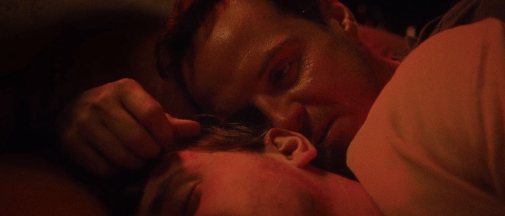
Would you have given either of these Irish thespians a Best Actor nomination? If the answer's yes, then which of AMPAS' chosen five deserves the boot?